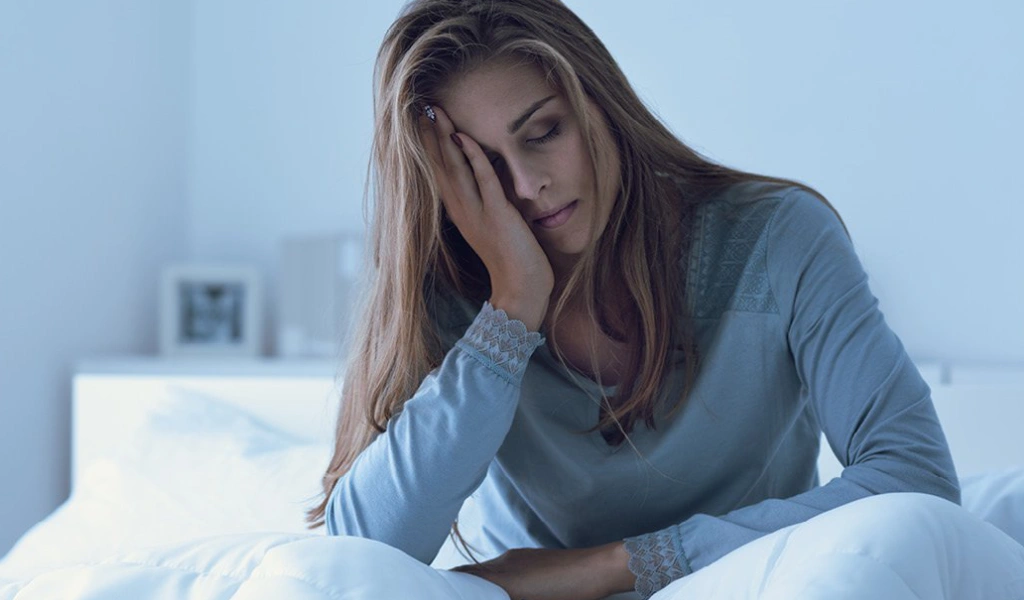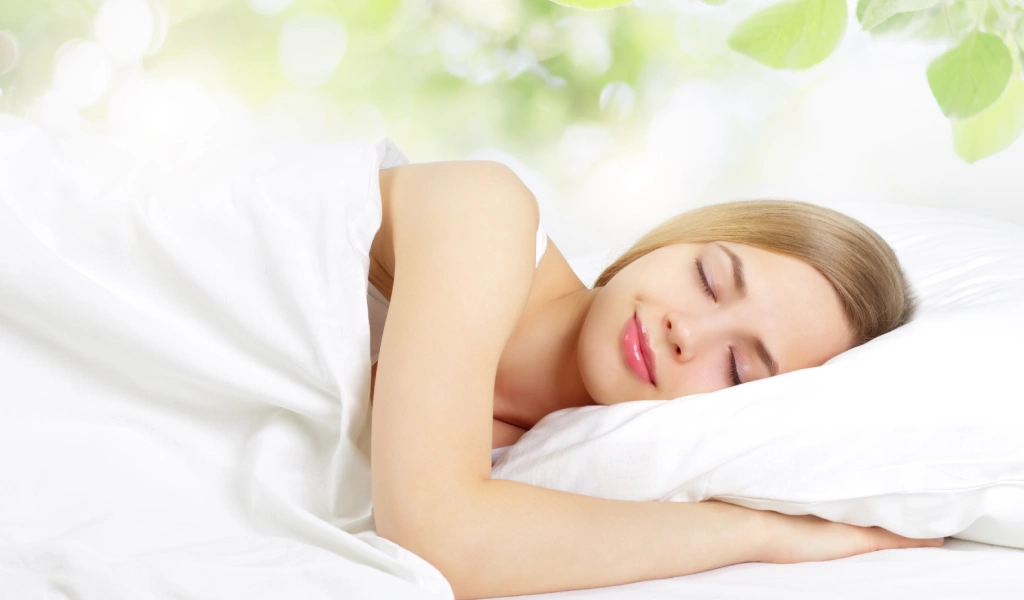Lack of adequate sleep known as sleep deprivation can have harmful consequences that may gradually impact your health, emotions, and perspective. Recognizing the early symptoms of sleep deprivation is key to addressing the issue.
In this article ‘What is Sleep Deprivation?‘ we will understand sleep deprivation, what are its symptoms, causes, and effects. We will also discover some tips to fix the sleep deprivation problem.1
What is sleep deprivation?
Sleep deprivation happens when you do not receive enough sleep that is necessary for the upkeep of your mental, physical, and emotional well-being. Up to one-third of individuals do not get enough sleep at night, whether it is because of stress, anxiety, heavy workload, family, or social commitments, or a sleep disorder like insomnia.2 The problem of sleep deprivation appears to be worsening over time.3
Many of us are familiar with the sensation of feeling the day following a night of inadequate or nonexistent sleep. During this time, you may experience drowsiness, lethargy, irritability, and a lack of energy. Your cognitive abilities may be impaired, making it difficult to concentrate, leading to errors, and causing a need for multiple cups of coffee to get through the day until bedtime.
Struggling with insomnia can be irritating, yet insufficient sleep can have a significant effect on your well-being.4 A shortage of sleep can influence your emotional state, stamina, and effectiveness. It can also compromise your immune system, heart health, mental capacity, sex drive, and aptitude for managing stress. Inadequate sleep may lead to weight gain, heightened risk of accidents, and a range of health issues like diabetes, high blood pressure, heart conditions, strokes, unease, and melancholy.

If you have been experiencing a lack of sleep for a prolonged period, it may begin to feel like a typical occurrence to feel constantly fatigued and not fully alert in your day-to-day life.5 Despite thinking that you can manage adequately with less sleep without any adverse effects, the truth is that adequate sleep is essential for your overall physical and mental health.
It is important to know the indicators, reasons, and impacts of sleep deprivation, no matter what your situation may be. This understanding is crucial to start tackling sleep deprivation and making sure you are getting enough sleep to support your well-being and peak performance.
Are you sleep-deprived ever?
The amount of sleep required varies from person to person, but most adults need between seven to nine hours of sleep each night.6 Children and teenagers may need even more, while older adults may require slightly less. If you consistently get fewer hours of sleep than recommended, you may be sleep deprived, even if you are not aware of the impact it is having on your emotions, behavior, and daily functioning, or the potential negative effects on your physical health in the long run.
However, when it comes to getting enough rest, it is not only the quantity of hours that matters, but also the quality of those hours. If you find it difficult to wake up in the morning or experience drowsiness throughout the day, it may indicate that the quality of your sleep is insufficient, even if you spend adequate time in bed.7
Interruptions such as noise, light, or physical discomfort may hinder your ability to spend adequate time in various sleep stages, notably deep sleep and REM sleep, reducing the overall quality of your sleep and worsening the effects of sleep deprivation.
Signs and symptoms of sleep deprivation
You may be sleep-deprived if you:
- Feel exhausted, cranky, and depleted during the day; yawn frequently.

- Struggle with concentrating or recollecting things.
- Have a decreased interest in sexual activity.
- Struggle to wake up in the mornings, relying on an alarm clock, or hitting the snooze button repeatedly.
- Feel sluggish or sleepy in the afternoons.
- Find it challenging to stay alert during lectures, meetings, warm environments, driving or commuting, or after eating a heavy meal.

- Feel the need to take a daytime nap.
- Drift off to sleep on the sofa at night.
- Quickly fall asleep within five minutes of getting into bed.
- Require extra sleep on weekends.

- Have experienced shifts in mood, such as feeling down, anxious, under pressure, paranoid, or having thoughts of suicide.
Understanding Sleep deprivation psychosis
In severe instances of sleep deprivation,6 when you have gone without or had very little sleep for an extended time, you might start to interpret reality differently or even undergo acute psychosis.
This may manifest as delusions, hallucinations, and disorganized thoughts, speech, and behaviors. Although these symptoms can be deeply unsettling, they typically subside once you have regained any lost sleep and established a proper sleep routine.
Various effects of sleep deprivation
Losing sleep might not appear significant at first, but sleep deprivation can have various adverse effects beyond feeling tired during the day. The consequences of sleep deprivation can accumulate over time, impacting various aspects of both your body and mind.
The consequences of sleep deprivation consist of
- Changes in vitality: Feeling fatigued, lethargic, and unmotivated in your work, school, and personal life. You may crave sugar, caffeine, or breaks throughout the day.
- Mental Health Issues: Insufficient sleep can result in mental health issues like mood swings, heightened irritability, an increased likelihood of depression and anxiety, and a decreased capacity to handle stress and challenging emotions. In severe situations, sleep deprivation can even lead to hallucinations and confusion.7

- Individuals with a weakened immune system may be more prone to experiencing multiple colds, infections, and respiratory illnesses.
- A decline in cognitive abilities, including difficulties with learning, concentration, and remembering. Sleep deprivation can reduce creativity and problem-solving skills, as well as affect decision-making, coordination, and reaction times. Not getting enough sleep can impair motor skills to a level similar to being drunk, increasing the risk of accidents.
- Not getting enough sleep can harm the heart by leading to inflammation and elevated levels of blood pressure and sugar, potentially raising the chances of developing heart disease.
- Having problems in a romantic relationship can result in arguments driven by increased irritability and anger issues. Additionally, insufficient sleep can decrease sexual desire, disturb hormone balance, and impact fertility.

- Alterations in looks, such as early signs of skin aging and an increase in body weight.
- The chance of encountering severe health issues like stroke, diabetes, heart disease, Alzheimer’s disease,8 and other types of cancer is higher.
Insufficient sleep can lead to weight gain, particularly around the waist
Have you ever noticed that when you don’t get enough sleep, you tend to crave sweet snacks for a quick energy pick-me-up? This is due to a strong link between lack of sleep, overeating, and weight gain.9
Inside your body, two hormones regulate hunger and fullness. Ghrelin boosts appetite, while leptin indicates when you are full. Lack of sufficient sleep leads to an increase in ghrelin levels, making you feel hungrier than normal.
Conversely, the decrease in leptin levels reduces satisfaction and increases the urge to eat continuously. Consequently, the body will have stronger cravings for food with less sleep.10
Causes of sleep deficiency
There could be various factors affecting your ability to sleep well at night, such as your daily routine and sleep surroundings, as well as disruptions due to stress, travel, or illness. Identifying the root cause of your sleeplessness will enable you to begin addressing the issue and ensure your body and mind receive the necessary rest.
Here are some of the typical reasons for sleep deprivation
- Uncontrolled stress and anxiety: In today’s unpredictable world, many individuals are experiencing stress related to their jobs, finances, and the health of themselves and their family members. Throughout the day, various distractions may keep you occupied, but it is usually at night, when you are alone with your thoughts, that your worries become prominent. It is common for anxious thoughts to emerge as you prepare to sleep, hindering your ability to rest peacefully. Instead of focusing on the present moment, concerns about past events or future possibilities can disrupt your sleep patterns.
- Shift Work: Working non-traditional hours like nights or rotating shifts can throw off your body’s natural sleep cycle, leading to feelings of sleepiness and fatigue. When you frequently work during these times, your sleep quality may suffer compared to those with regular daytime schedules.

- Inadequate behaviors during the day or unsuitable sleeping conditions: The reason why you may not be getting enough or good quality sleep at night can frequently be linked to how you spend your day. Consuming excessive amounts of caffeine, lack of physical activity, looking at screens before bedtime, or having a bedroom that is too hot, well-lit, or noisy can all play a role in disrupting your sleep.
- Having a sleep disorder like sleep apnea, narcolepsy, or restless legs syndrome can affect your capacity to obtain sufficient high-quality sleep during the night, leading to sleep deprivation.
- Substance abuse: Although alcohol may speed up the process of falling asleep, it can negatively impact the quality of sleep by worsening snoring, interfering with REM sleep, and causing early awakenings.11 Additionally, the consumption of stimulants like cocaine or amphetamines can also disturb sleep patterns and lead to staying awake throughout the night leading to sleep deprivation.

- Health concerns: Your sleep problems could be due to a medical condition like physical pain, heartburn, thyroid disease, depression, anxiety, or bipolar disorder. Fragmented sleep is common in older adults with dementia, and long-haul COVID cases have also been associated with poor sleep. Additionally, some medications may have side effects that disrupt sleep patterns.
- Duties of providing care: Taking care of an elderly parent or a newborn with colic at night can disrupt your sleep both in terms of quantity and quality.
One way to monitor your symptoms and sleep patterns is by keeping a sleep diary
A useful tool for identifying the reason behind your sleep deprivation is keeping a sleep diary to track your sleeping patterns and daily activities. Consider using a sleep app on your smartphone or simply jotting down information like:
- Your bedtime and wake-up time.
- The duration of your sleep and how rejuvenated you felt upon waking.
- The level of physical activity you engaged in throughout the day.
- Your response if you experienced difficulty falling asleep after waking up.
- The type of food and beverages you ingest before going to bed.
- Your emotions and mindset before bedtime (such as feeling stressed, anxious, or sad).
- Any substances or medications you took.
After writing in the diary for about a week, you might start noticing patterns where certain actions or emotions are connected to disturbances in your sleeping patterns.11
Dealing with or stopping the occurrence of sleep deprivation
If you consistently feel tired throughout the day due to insufficient sleep, it is important to take steps to address this issue. While it may be tempting to rely on medication for a quick fix, there are many alternative methods to enhance the amount and quality of your sleep without the need for pills.
Sleeping pills and sleep aids can be beneficial for temporary relief, but they do not provide a permanent solution and do not tackle the root causes of sleep issues.12 They may worsen symptoms over time. It is more effective to make lifestyle and behavioral adjustments to improve sleep quality and regain a healthy sleep pattern.13
- Soothe your restless thoughts before bed: Before going to bed, it is best to avoid looking at screens, working, and engaging in stressful conversations. It is more beneficial to create a soothing bedtime ritual that helps you relax and quiet your thoughts. Consider taking a warm bath, listening to gentle music or an audiobook, reading under soft lighting, or trying relaxation methods like deep breathing, meditation, or progressive muscle relaxation.
- Delay your concerns: If you find yourself unable to sleep at night due to worrying, write down your concerns on paper and permit yourself to postpone worrying until the next day. After a restful night’s sleep, you’ll be better equipped to address the issue.
- Handle stress: You can discover techniques to effectively handle stress in a healthy manner, which can help reduce tension and anxiety, and improve the quality of your sleep.
- Engage in consistent physical activity: Regularly participating in physical activity is not only beneficial for reducing stress, but it can also enhance your emotional health and aid in addressing sleep issues. It is recommended to aim for a minimum of 30 minutes of exercise daily, however, it is crucial to refrain from working out right before bed as it may disrupt your ability to sleep properly.

- Maintain a regular bedtime schedule: Establishing a regular bedtime and waking up at the same time every day, even on weekends, is important for keeping your body’s internal clock in check.
- Minimize the effects of working non-traditional hours: You can adjust your sleep schedule by increasing light exposure with bright lights during the day and reducing light exposure at night when it’s time to sleep. Utilize blackout shades or thick curtains to make your bedroom dark during daylight hours.
- Pay attention to the food and drinks that you consume: Consuming excessive quantities of sugary foods, alcohol, and caffeine during the day can disrupt one’s sleep patterns at night. Consuming a substantial meal immediately before bedtime might impede one’s ability to fall asleep easily, while excessive consumption of fluids can disturb one’s sleep by causing frequent awakenings throughout the night.

- Improve the environment in which you rest during sleep: The greater the sense of ease you experience when preparing for sleep, the higher the probability of obtaining a restful night’s rest. Investing in new bedding materials such as pillows, mattresses, or adjustable beds can elevate your comfort level and contribute to better sleep quality. Additionally, it is crucial to establish a tranquil and dimly lit ambiance in your sleeping quarters, ensuring a cool temperature for optimal relaxation. Lastly, limiting the use of your bed solely to sleeping and intimacy while refraining from engaging in screen time, work-related tasks, or other stressful activities can further promote restfulness.
- Seek assistance for caregiving responsibilities: As a family caregiver, neglecting sleep can lead to rapid exhaustion and jeopardize the well-being of both yourself and the individual under your care. It is advisable to seek assistance from others to alleviate the demands of caregiving and prioritize your rest.
Conclusion
If you believe a medical problem is causing you trouble sleeping, it’s best to talk to a doctor. Getting advice from a healthcare professional is crucial in dealing with any health issues that might be affecting your sleep, or adjusting medications that could be making it worse.
















